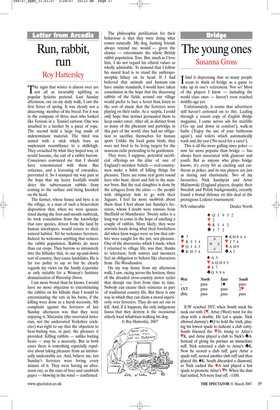Run, rabbit, run
Roy Hattersley
The signs that winter is almost over are not all as invariably uplifting as popular lyricists pretend. Last Sunday afternoon, out on my daily walk, I saw the first ferret of spring. It was clearly not a discerning member of the breed. For it was in the company of three men who looked like Fenians in a Tenniel cartoon. One was attached to a lurcher by a piece of rope. The second held a large bag made of indeterminate material. The third was armed with a stick which bore an unpleasant resemblance to a shillelagh. They crouched by what they hoped was, or would become, the exit of a rabbit burrow. Conscience convinced me that I should have remonstrated with them. But reticence, and a leavening of cowardice, prevented it. So I stamped my way past in the hope that my heavy footfalls would deter the subterranean rabbits from coming to the surface and being knocked on the head.
The farmer, whose house and byre is in the village, is a man of such a benevolent disposition that, when we were quarantined during the foot-and-mouth outbreak, he took consolation from the knowledge that rare species, driven from the land by human interlopers, would return to their natural habitat. Yet he welcomes ferreters. Indeed, he welcomes anything that reduces the rabbit population. Rabbits do more than eat crops. They burrow so intensively into the hillsides that, in our up-and-down sort of country, they cause landslides. He is far too polite to say so but he clearly regards my views on the family Leporidae as only suitable for a Women’s Institute dramatisation of Watership Down.
I am more brutal than he knows. I would have no more objection to exterminating the rabbits on his hillside than I would to exterminating the rats in his barns, if the killing were done as a harsh necessity. My complaint against the ferreters of last Sunday afternoon was that they were enjoying it. Macaulay (the overrated historian, not the underrated Yorkshire cricketer) was right to say that the objection to bear-baiting was, in part, the pleasure it provided. Killing rabbits — unlike baiting bears — may be a necessity. But in both cases there is something especially repulsive about taking pleasure from an intrinsically undesirable act. And, believe me, last Sunday’s ferreters were loving every minute of it. They were having an afternoon out, as the cans of beer and sandwich paper — blowing in the wind — confirmed. The philosophic justification for their behaviour is that they were doing what comes naturally. My dog, hunting friends always remind me, would — given the chance — exterminate the whole British rabbit population. True. But, much as I love him, I do not regard his ethical values as wholly admirable. To demand that I follow his moral lead is to stand the anthropomorphic fallacy on its head. If I had believed that animals and humans can have similar standards, I would have taken consolation in the hope that the discerning rabbits of the fields around our village would prefer to face a ferret than listen to the sort of music that the ferreters were playing on their radio. As a sceptic, I could only hope that instinct persuaded them to keep under cover. After all, as distinct from so many of the pheasant and partridge in this part of the world, they had no obligation to sacrifice themselves for human sport. Unlike the local game birds, they were not bred to be living targets for the nouveau riche pretending to be gentlemen.
They were, I suppose, potential sacrificial offerings on the altar of one of England’s weirdest beliefs — real countrymen make a habit of killing things for pleasure. There are some real gents round here who hunt, shoot and fish to the manner born. But the real slaughter is done by the refugees from the cities — the people with obligatory 4x4s to go with their Jaguars. I feel far more snobbish about them than I feel about last Sunday’s ferreters, whom I doubt were townies from Sheffield or Manchester. Twenty miles is a long way to come in the hope of catching a couple of rabbits. More likely, they were atavistic locals doing what their forefathers did when farm wages were so low that rabbits were caught for the pot, not pleasure. One of the discoveries which I made, when I returned to village life, was that, thanks to television, both natives and incomers feel an obligation to behave like characters from The Woodlanders.
On my way home from my afternoon walk, I saw, racing across the horizon, three of the dreaded cross-country motor cycles that disrupt our lives from time to time. Nobody can excuse their existence as part of traditional country life. But there is one way in which they can claim a moral superiority over ferreters. They do not set out to kill. And, if it happens, the only indigenous fauna that they destroy is the occasional elderly local inhabitant walking his dog.
© Roy Hattersley, 2007










































































 Previous page
Previous page